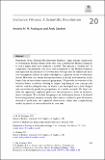Inclusive fitness : a scientific revolution
Abstract
Proponents of the “Extended Evolutionary Synthesis” argue that the current state of evolutionary biology departs from what was established in Modern Synthesis to such a degree that a new synthesis is needed. They present a “laundry list” of complaints concerning the core focus and assumptions of the Modern Synthesis and argue that the perspective of evolutionary biology must be shifted and these core assumptions relaxed in order to incorporate a plethora of new evolutionary factors. However, we contend that this revolution is already well underway, in the form of the inclusive-fitness research programme. We provide an overview of the inclusive-fitness revolution, charting its origins, explaining its core concepts and outlook, and describing the ways in which it has developed into a fully fledged and extraordinarily productive programme of scientific research. We then consider the apparently neglected processes and perspectives from an inclusive-fitness viewpoint. We conclude that progress in evolutionary theory is facilitated by focusing research attention on areas where there is a relatively poor fit between theoretical predictions and empirical observations, rather than complexifying models in pursuit of extra realism for its own sake.
Citation
Rodrigues , A & Gardner , A 2023 , Inclusive fitness : a scientific revolution . in T Dickins & B Dickins (eds) , Evolutionary biology : contemporary and historical reflections upon core theory . Evolutionary biology – new perspectives on its development , vol. 6 , Springer , Cham , pp. 343-360 . https://doi.org/10.1007/978-3-031-22028-9_20
Publication
Evolutionary biology
Status
Peer reviewed
ISSN
2524-7751Type
Book item
Description
Funding: Natural Environment Research Council (NE/K009524/1) and European Research Council (771387).Collections
Items in the St Andrews Research Repository are protected by copyright, with all rights reserved, unless otherwise indicated.

